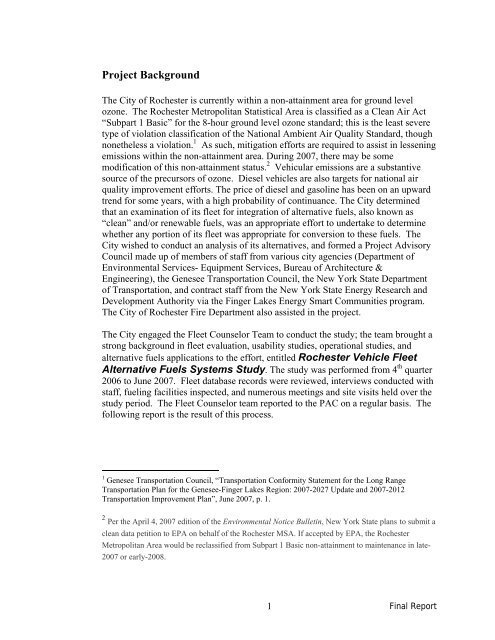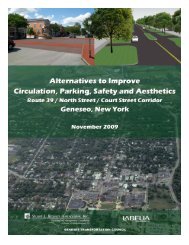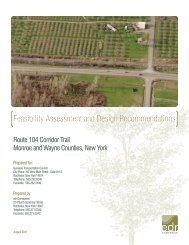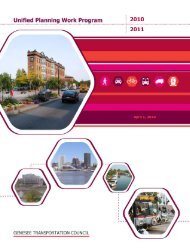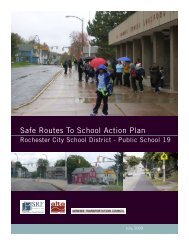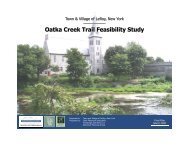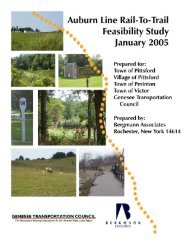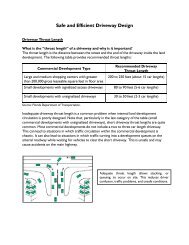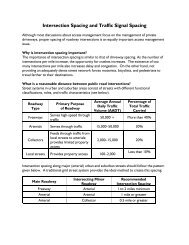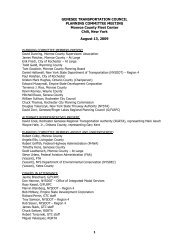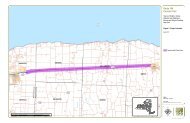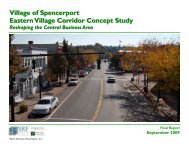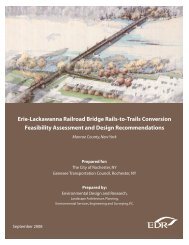Final Report Rochester Vehicle Fleet Alternative Fuels Systems Study
Final Report Rochester Vehicle Fleet Alternative Fuels Systems Study
Final Report Rochester Vehicle Fleet Alternative Fuels Systems Study
You also want an ePaper? Increase the reach of your titles
YUMPU automatically turns print PDFs into web optimized ePapers that Google loves.
Project Background<br />
The City of <strong>Rochester</strong> is currently within a non-attainment area for ground level<br />
ozone. The <strong>Rochester</strong> Metropolitan Statistical Area is classified as a Clean Air Act<br />
“Subpart 1 Basic” for the 8-hour ground level ozone standard; this is the least severe<br />
type of violation classification of the National Ambient Air Quality Standard, though<br />
nonetheless a violation. 1 As such, mitigation efforts are required to assist in lessening<br />
emissions within the non-attainment area. During 2007, there may be some<br />
modification of this non-attainment status. 2 Vehicular emissions are a substantive<br />
source of the precursors of ozone. Diesel vehicles are also targets for national air<br />
quality improvement efforts. The price of diesel and gasoline has been on an upward<br />
trend for some years, with a high probability of continuance. The City determined<br />
that an examination of its fleet for integration of alternative fuels, also known as<br />
“clean” and/or renewable fuels, was an appropriate effort to undertake to determine<br />
whether any portion of its fleet was appropriate for conversion to these fuels. The<br />
City wished to conduct an analysis of its alternatives, and formed a Project Advisory<br />
Council made up of members of staff from various city agencies (Department of<br />
Environmental Services- Equipment Services, Bureau of Architecture &<br />
Engineering), the Genesee Transportation Council, the New York State Department<br />
of Transportation, and contract staff from the New York State Energy Research and<br />
Development Authority via the Finger Lakes Energy Smart Communities program.<br />
The City of <strong>Rochester</strong> Fire Department also assisted in the project.<br />
The City engaged the <strong>Fleet</strong> Counselor Team to conduct the study; the team brought a<br />
strong background in fleet evaluation, usability studies, operational studies, and<br />
alternative fuels applications to the effort, entitled <strong>Rochester</strong> <strong>Vehicle</strong> <strong>Fleet</strong><br />
<strong>Alternative</strong> <strong>Fuels</strong> <strong>Systems</strong> <strong>Study</strong>. The study was performed from 4 th quarter<br />
2006 to June 2007. <strong>Fleet</strong> database records were reviewed, interviews conducted with<br />
staff, fueling facilities inspected, and numerous meetings and site visits held over the<br />
study period. The <strong>Fleet</strong> Counselor team reported to the PAC on a regular basis. The<br />
following report is the result of this process.<br />
1 Genesee Transportation Council, “Transportation Conformity Statement for the Long Range<br />
Transportation Plan for the Genesee-Finger Lakes Region: 2007-2027 Update and 2007-2012<br />
Transportation Improvement Plan”, June 2007, p. 1.<br />
2 Per the April 4, 2007 edition of the Environmental Notice Bulletin, New York State plans to submit a<br />
clean data petition to EPA on behalf of the <strong>Rochester</strong> MSA. If accepted by EPA, the <strong>Rochester</strong><br />
Metropolitan Area would be reclassified from Subpart 1 Basic non-attainment to maintenance in late-<br />
2007 or early-2008.<br />
1<br />
<strong>Final</strong> <strong>Report</strong>


